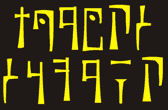Hylian Language
The Hylian Language appears in multiple The Legend of Zelda games in many different forms. The language changes and evolves along with Hyrule. Hylian cannot be spoken, as the only two characters with full voice acting are Midna and Fi; however, it can be written.
A Link to the Past
Hylian as a written language first appeared in A Link to the Past as untranslatable symbols. The only way to actually read what they say is to use the Book of Mudora.
Two notable locations where Hylian appears are on a tablet outside the Desert Palace and on the Pedestal of Time. Hylian is also written on the tablets used to get the Bombos Medallion and the Ether Medallion.
Link's Awakening
Hylian appears briefly in Link's Awakening on an image in Face Shrine, next to a picture of the Wind Fish. It details the truth of Koholint Island. Like in A Link to the Past, it cannot be translated.
Ocarina of Time and Majora's Mask
The Hylian in Ocarina of Time and Majora's Mask is the same, despite that Majora's Mask is set in Termina and not Hyrule. Unlike its previous incarnations, Hylian in these games is an actual language, capable of being written and read. It is found in many different locations around the world, such as on signs or walls.
Hylian in Ocarina of Time can be translated into Japanese with the help of translation guides.
The Wind Waker
Hylian appears again in The Wind Waker in a similar manner to Ocarina of Time and Majora's Mask, but with a different alphabet. It is seen on items, signs, and many other places. Valoo, the Great Deku Tree, and Jabun all speak in this language in the first playthrough of the game. However, after the game has been completed and the file is restarted, their text will be translated into the game's language. The manual to The Wind Waker in Japan also came with a guide detailing how to translate the Hylian text into Japanese.
This form of the language also appears in The Minish Cap, Phantom Hourglass, and Spirit Tracks.
Twilight Princess
In Twilight Princess, Hylian again makes an appearance as labeling in background environments and items. However, this time it is based on English instead of Japanese. The world map is covered in Hylian labels, as well as the Dungeon Maps. Some of the words in Hylian may be spelled differently, due to their Japanese origin; for example, the text written on the Dungeon Map for Goron Mines reads "Golon" instead of "Goron".
The Hylian language from The Wind Waker is found on the gravestones in the Kakariko Village Graveyard, despite the two games' locations on opposite sides of the post-Ocarina of Time Timeline split.
In Twilight Princess HD, Miiverse Stamps can be found for each letter in the Hylian alphabet.
- Twilight Princess HD Hylian letter Miiverse Stamps
Skyward Sword
A new form of Hylian is found in Skyward Sword, but it is used less frequently than in previous installments in the franchise. It is still written on signs, but it is absent from any of the maps, and it usually does not appear in backgrounds. It is most frequently found in the Lanayru Province, particularly in the Lanayru Mining Facility, suggesting that it was used primarily by the Ancient Robots. Nintendo denied an actual translation of Hylian in Skyward Sword, but fans found that the entire alphabet is repeated twice on signs in the Lanayru Sand Sea regions. It can be translated into English, but unlike in Twilight Princess, some characters stand for two different letters.
The North American Box Art for Skyward Sword has Hylian from Twilight Princess written on it, rather than the language from the actual game. It has the names of the Golden Goddesses and their elements: Power, Wisdom, and Courage.
Supposedly, Zelda sings the lyrics to the Ballad of the Goddess in Hylian.



